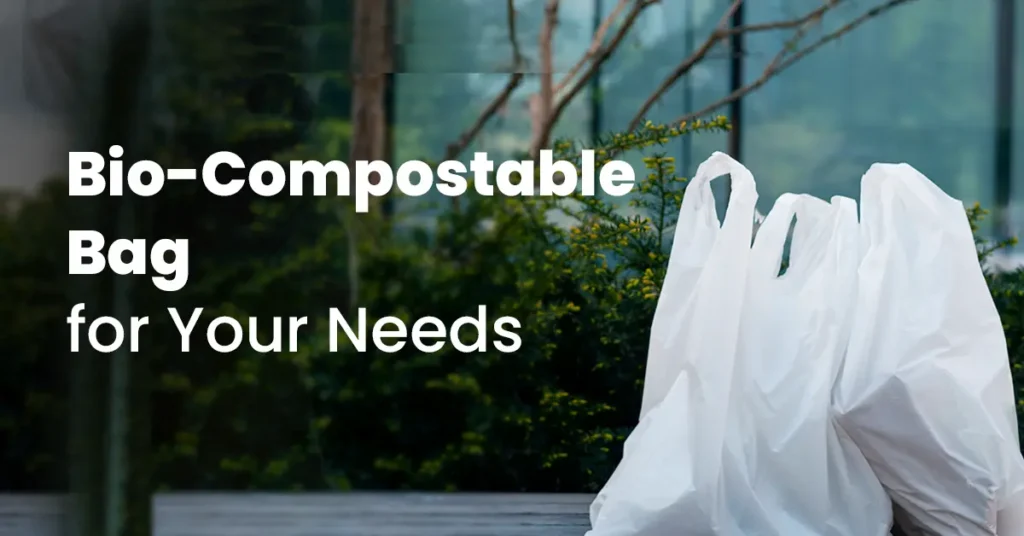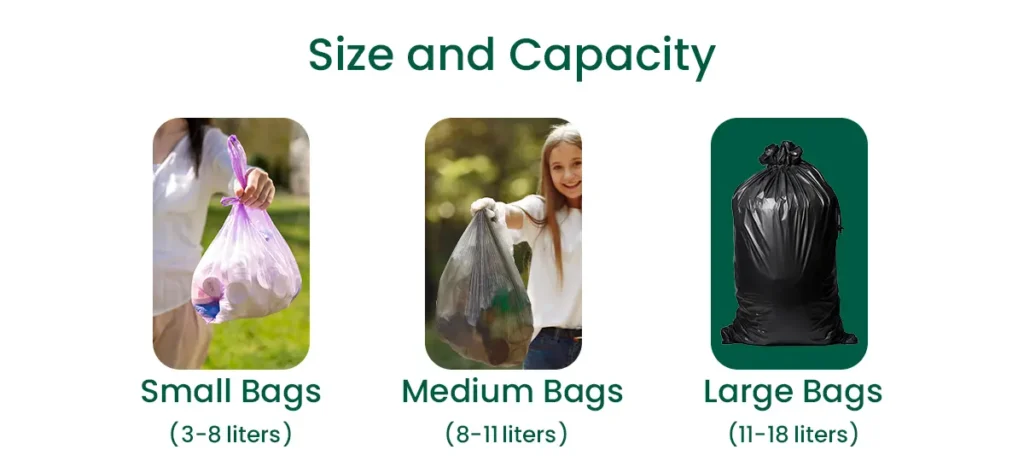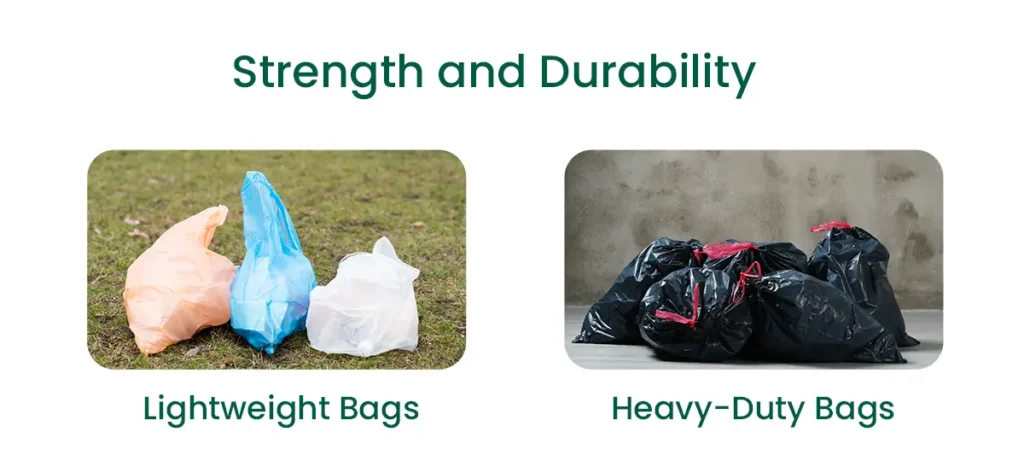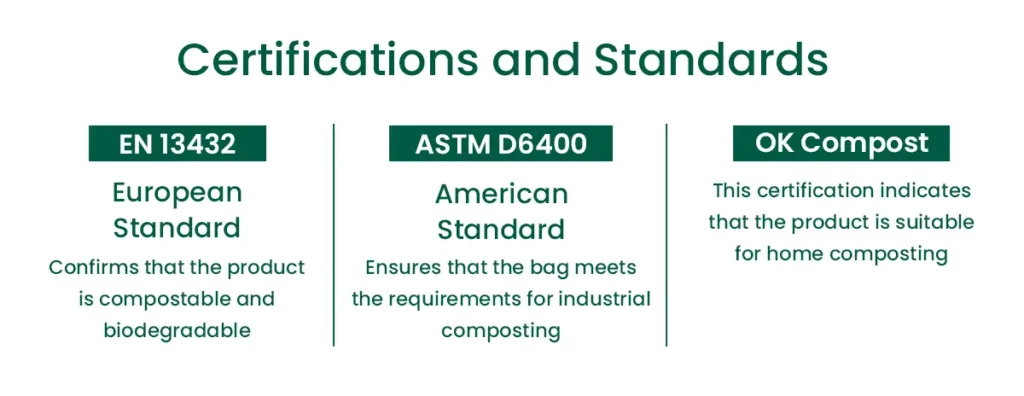
We live in an eco-conscious world, and choosing the right bio-compostable bag has become more than just a trend. People and even companies now consider adopting bio-compostable bags a necessity for reducing plastic waste and contributing to the environment. While there are multiple options available in the market, understanding the right bio-compostable bags for your specific needs so you don’t get fooled by the marketing gimmicks and pay for what you need.
This blog explores the many aspects that should be considered when finding the perfect eco-friendly bag for the eco-conscious you.
Factors to consider when selecting the right bio-compostable bags
1. Size and Capacity
Bio-compostable bags are available in a range of sizes, types, microns, and capacities to suit various needs and purposes. Whether you need grocery bags, carry bags, pharmacy bags, garbage bags, or shopping bags, we have options to fit every requirement:
- Small Bags (3-8 liters): Perfect for small bins, kitchen scraps, or storing produce.
- Medium Bags (8-11 liters): Ideal for office use, medium-sized waste bins, or garden waste.
- Large Bags (11-18 liters): Suitable for outdoor bins, commercial purposes, or large-scale composting.
Explore our selection to find the right type and size for your specific needs.

- Strength and Durability
The strength and durability of bio-compostable garbage bags vary depending on their micron level, size, and intended capacity. Some bags are designed to handle lightweight items, while others are built to carry heavier loads without tearing or leaking.
- Lightweight Bags: Suitable for dry waste or lightweight compost materials.
- Heavy-Duty Bags: Best for wet waste, heavier items, or when there is a need to prevent leakage.
Look for bags that mention their load-bearing capacity and intended usage on the packaging to avoid any mishaps
- 30 Micron Bags: These are lightweight options, ideal for carrying dry waste or lighter compost materials. For instance, a 14″ x 17″ bag with a 3 kg capacity weighs 8.65 grams and is suited for lighter loads.
- 35 Micron Bags: Slightly thicker and stronger, these bags can handle up to 7 kg, making them suitable for both dry and moderately wet waste. A 19″ x 21″ bag, for example, weighs 16.92 grams.
- 40 Micron Bags: These bags are designed for heavier items, like wet waste, with capacities ranging from 8 to 18 kg. A 20″ x 25″ bag, carrying up to 10 kg, is ideal for preventing leaks.
- 50 Micron Bags: Offering even more strength, these bags are perfect for substantial loads. A 30″ x 40″ bag with a 15 kg capacity weighs 72.72 grams, providing reliable durability.
- 60 Micron Bags: The most robust option, these bags can handle up to 18 kg, making them ideal for the heaviest waste. A 30″ x 50″ bag weighing 109.09 grams is designed to carry large and heavy items without tearing.
When choosing a bag, it’s essential to consider the micron level, size, and weight capacity to ensure it meets your specific needs and avoids any potential mishaps.

- Material Composition
The material composition of bio-compostable bags is crucial for their strength, durability, and composting efficiency. When choosing a bio-compostable bag, it’s important to consider the materials used, especially if you plan to dispose of the bag in an eco-friendly way. Here’s a look at common materials:
- Cornstarch-Based Bags: Made from corn starch, these bags are very popular for their quick decomposition in composting environments. They are ideal for household use, including kitchen waste and garden clippings.
- PLA (Polylactic Acid) Bags: PLA bags, derived from fermented plant starch, are known for their strength and durability. They are commonly used for food packaging and shopping bags.
- Blended Bags: Some bags are made from a combination of plant-based materials, designed to balance strength with biodegradability. These bags are often used for heavier tasks, such as handling lawn and garden waste.
- Certifications and Standards
Ensure that the bio-compostable bags you choose meet recognized standards and certifications. You can look for certifications:
- EN 13432 (European Standard): Confirms that the product is compostable and biodegradable.
- ASTM D6400 (American Standard): Ensures that the bag meets the requirements for industrial composting.
- OK Compost: This certification indicates that the product is suitable for home composting.
These certifications provide assurance of the bag’s eco-friendliness and composting efficiency.

- Specific Use Cases
Consider how you plan to use the bio-compostable bags. Are you looking for bags to dispose of kitchen waste, or do you need something for gardening or commercial purposes? Different applications will require bags with different characteristics.
- Food Storage: Choose compostable bags that are food-grade and safe for direct contact with edibles.
- Garden Waste: Opt for durable bags that can handle moisture and sharp objects like twigs and leaves.
- General Waste Management: Look for bags that provide an excellent balance of strength and biodegradability for everyday use.
- Environmental Impact
While bio-compostable bags are better for the environment than traditional plastics, some materials have a greater positive impact than others. Ensure that the bag is not only compostable but also made from sustainably sourced materials.
Next Steps!
By carefully evaluating these aspects, you can choose a bag that meets your needs and supports your sustainability goals. At Tellus, we offer a wide range of high-quality, certified cornstarch-based bio-compostable bags in various microns and weight capacities. From lightweight options to heavy-duty choices, our bags are designed to cater to different applications and ensure reliable performance. Explore our collection to find the perfect solution for your sustainable lifestyle.
